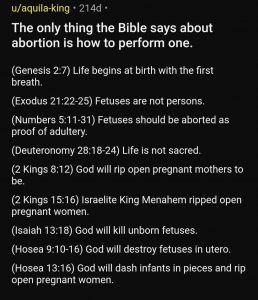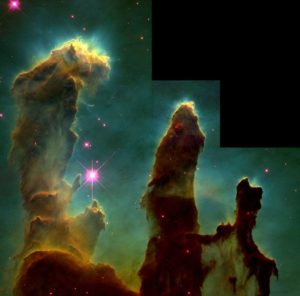[AUTHOR'S NOTE: Hat tip to TC and Emily for serving as inspiration for this article.] Atheists typically don't like organized religion, and many will seize just about any excuse to attack the beliefs of theists. Only yesterday a friend of mine posted a political comment on social media that mentioned abortion, yet somehow an atheist lurking in the shadows managed to bring religion into the conversation by claiming the Bible doesn't condemn abortion. In my response I pointed out that Scripture doesn't mention nuclear war or space travel either, because those things also didn't exist when the Bible was written. Elective surgery by a medical doctor to kill an unborn child in the womb wasn't simply available when Jesus walked the Earth. 13 weeks into pregnancy His argument was weak, but my new atheist acquaintance was just getting warmed up. Next this particular religion critic boldly claimed the Bible was a work of fiction, which is an odd statement for an atheist to make. Most of my atheist friends realize the best strategy is to remain on offense and attack religion while carefully avoiding any knowledge claims they might have to defend. For example, most atheists will say something safe like "I believe the Bible is fiction" instead of "the Bible is fiction" because the former is merely stating an opinion, but the latter is a knowledge claim that will ultimately need to be defended with empirical evidence. Everyone is entitled to have an opinion, but not their own independent set of facts. And the fact of the matter is, the claim the Bible is a work of fiction … [Read more...]
Panspermia
The concept of panspermia was first introduced to me by National Lampoon in the form of a joke--one issue of the magazine contained a description of a new version of the video game Space Invaders in which players are encouraged to "knock down the invading sperm from space before they knock up your little sister." Well, I laughed. I don't apologize for my often bizarre sense of humor. In my opinion, one ought to be able to admit that the idea of extraterrestrial sperm coming from outer space to create life on Earth is pretty funny. What's even funnier is panspermia is actually a scientific hypothesis that mostly exists because of a mathematics problem, created by the foolish assumption of secular-minded scientists that creation can come to exist without a Creator. After DNA was discovered, calculations were performed to determine low long it would take "Nature" to produce a double helix without intelligent help. Even the most optimistic projections could not explain how life came to exist so quickly after the Earth was created (approximately 4 billion years ago). The same experts say that the earliest forms of life appeared on Earth 3.6 billion years ago, only 400 million years later. The mathematics problem associated with the origin of life on Earth stems from calculations of how long experts have estimated it would take for DNA to form by luck and random chance. The most optimistic estimates require a lot more time than four hundred million years. Because the universe is many billions of years older than Earth, by invoking panspermia and proclaiming the … [Read more...]
Semantic arguments about the origin of life
A semantic argument means literally having an argument about the precise meaning of a word or phrase. For communication to effectively occur between any two people, there must be some common understanding about the definitions of the words being used. For example, "mostly peaceful" protestors could also be described as "occasionally violent" rioters, depending on one's own perspective. Some people like to watch grown men put on boxing gloves and beat each other into a bloody pulp, but my idea of great entertainment is to watch a verbal jousting match between two intellectuals about a subject that ought to interest all of us, the origin of life. So, as I watched the debate between organic chemist Lee Cronin and synthetic chemist James Tour on the Unbelievable podcast hosted by Justin Brierly, I naturally expected to hear technical jargon and terminology used in their discussion that would sound foreign to me. While I was worried a phrase like “self-assembly of a nanoscale transition metal cluster” would baffle me, it honestly never occurred to me that these two brilliant scientists would be using words like "life" and "information" in a context that I didn't quite understand. https://www.youtube.com/watch?v=3DHvNRK452c After Dr. Tour provided the "textbook" definition of life according to Google (composed of cells, can reproduce, metabolize, etc.), and then said, “Information itself is not life. Would you agree with that? Life has information, but information itself is not life. I can have a piece of paper and write on that piece of paper. That piece of paper … [Read more...]
A Universe From Nothing
I've been thinking about writing another nonfiction book in the same vein as Divine Evolution and Counterargument for God. The tentative title of this planned new work is God or Good Luck? The difference between this new book and those first two books is that I don't plan on quoting anybody else, only to cite their work and suggest to my readers that they should investigate on their own. No footnotes, or end notes, and no need for a bibliography. In my opinion, not only should you doubt everything I say and investigate it on your own, you should take that approach with anything you read, no matter who wrote it. This time I plan to begin my argument at the beginning and take it straight through to the end in the most coherent manner possible, so the point I'm trying to make is so crystal clear and no one could possibly claim to be confused, not even my harshest critic (who skipped over most of the book he critiqued). Even the title of this proposed new book is pretty self-explanatory...the best explanation of "everything" or anything can be easily boiled down to a dichotomy of only two real choices: it's either God or good luck. Any and every other potential answer can ultimately be shown to be an inferior (and inadequate) substitution for one or the other--whether that suggested alternative is claimed to be science, nature, multiverses, quantum physics, string theory, an invisible wizard who lives in the sky, or even a flying spaghetti monster. Every one of them is a form of good luck, or represents a god. Absent a creator God, the existence of our universe becomes … [Read more...]
A Universe From Nothing
Pillars of creation photo: NASA, Jeff Hester, and Paul Scowen (Arizona State University) I keep telling myself that I've said all I needed to say in my first two nonfiction books (Divine Evolution and Counterargument for God) but then I realize that the issue still hasn't been resolved and so the debate isn't over. It's never going to be over, but that doesn't mean I'll be writing nonfiction books and articles rehashing the same points, over and over. When the spirit moves me (literally) I can't let it go. I think there's a third book in the works that will be titled God or Good Luck? Whether or not you understand that fact, those are really your only two choices. Nobel Laureate Werner Heisenberg famously made the most honest and truthful statement about atheism I've ever read: "The first gulp from the glass of natural sciences will turn you into an atheist, but God is waiting for you at the bottom of the glass." What does that mean? It's actually pretty simple. I can speak from experience, because it happened to me. I had graduated from a "Christian" high school that provided a quality education that was careful not to conflict with any biblical teachings. As a result, the first time I ever heard the term "The Big Bang" to describe the origin of the universe was in college. I had not been taught that science believed humans and apes shared a common primate ancestor and had "evolved" from more primitive species as an indisputable fact...it was merely what some biologists believed. I had been taught from the perspective of Young Earth Creationism, and so college … [Read more...]




